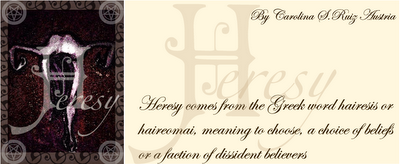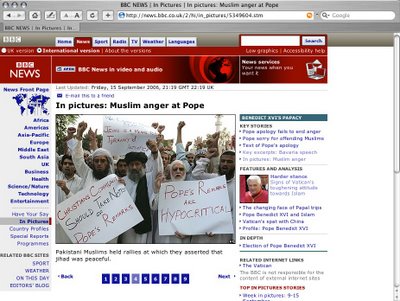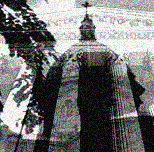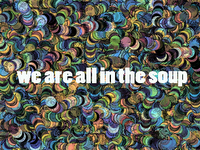Faith and Freedom

"Conscience is a tricky business. Some interpret its personal beacon as the guide to universal truth. But the assumption that one's own conscience is the conscience of the world is fraught with dangers. As C.S. Lewis wrote, "Of all tyrannies, a tyranny sincerely exercised for the good of its victims may be the most oppressive. It would be better to live under robber barons than under omnipotent moral busybodies. The robber baron's cruelty may sometimes sleep, his cupidity may at some point be satiated; but those who torment us for our own good will torment us without end for they do so with the approval of their own conscience."
R. Alta Charo, J.D., "The Celestial Fire of Conscience — Refusing
to Deliver Medical Care," New England Journal of
Medicine 352;24 June 16, 2005. 2471
Faith and freedom belong together. It simply isn't possible to value one over the other because the practice of faith or even its possibility is unlikely without freedom.We only have to look at today's headlines to realize that conflicts in the name of religion are raging and fuelling all manner of conflicts - and wars. More than ever, religious tolerance, as a path to peace is of utmost importance.
As far as the proposed Bill's author is concerned, religious freedom is of paramount importance. While we fully agree with this sentiment , we do not agree that the Bill's provisions support the same principle.
The Definition of Conscience
In the Bill, the "right of conscience" is narrowly defined as the right "not to participate" in medical procedures such as artificial birth control, sterilization, ligation, artificial insemination, assisted reproduction, human cloning, euthanasia, human embryonic stem cell research and fetal experimentation and other related services involving complex ethical and moral issues, that violate his or her conscience."
Indeed, while objections to the same procedures can come from a myriad of other religious and ethical beliefs and not solely Catholic ones, in our given context wherein the Bill is sought to be enacted, the Catholic hierarchy stands apart from its religious counterparts in its stand against modern family planning methods.
It is worth pointing out that the Muslim community has adopted a Fatwah in support of reproductive health care in the country and that alliances of Christian churches and sects have come in similar support for reproductive health care. Hence our quandary: Is the right to conscience in the Bill, exclusively a traditional Catholic conscience?
Secondly, the Bill also extends "rights of conscience" to Medical and Health Institutions, and even Payers (Health Insurance Companies!) similarly giving them the same right to refuse participation, in the same set of enumerated procedures. Again this raises the question of whether the conscience sought to be protected here is a traditionally Catholic conscience," and in so saying accessible only to Catholic run hospitals and clinics or Catholic plan and insurance companies?
This provision gives rise to more than one set of problems. Apart from giving hospitals and clinics, corporate persons the same footing as individuals in the "exercise" of conscience, the bill focuses solely on the aspect of "non-participation."
Can not a medical or health professional also claim that to opt to participate in a medical procedure sorely needed and requested by a patient, is also an act of conscience? In case of conflict, whose conscience in such cases will get protection?
The point is simply that difference in religious beliefs is a reality even in a predominantly Catholic population such us ours. Certainly the point of any legislation seeking to protect religious exercise should be to promote freedom, and not sanction religious discrimination of minorities.
Immunity from Liability:
A Grave Danger to Patients
The Bill's grant of immunity from liability to those it seeks to protect is dangerously broad, extending the option of non-participation beyond the conduct of the actual procedure, but likewise to include a refusal to give information, as well as the refusal to pay as in the case of health plan and insurance companies: all in the name of conscience, as defined in the Bill.
As worded, the Bill literally and sadly leaves powerless patients vulnerable to abuse and discrimination for having a different set of beliefs with that of their health care providers. In the context of the relationship of Patients with their Doctors, no less than the Hippocratic oath reflects the recognition that Doctors possess great power over their patients. The oath exists precisely to check those powers.
The realm of medical ethics already provides us with many useful guidelines and examples, among them, the FIGO Ethical Guidelines for Conscientious Objection. If anything, the Bill is an impractical measure because it attempts to "fix" concepts like conscience and ends up regulating free "religious exercise" through legislation, protecting only some.
Religious freedom protected by our Constitution is made up of the free exercise clause, and the non-establishment and separation clauses. With the recognition that religious difference is both a function and consequence of such freedom, our Supreme Court has time and again stood firmly in upholding religious freedom, especially when minorities faced dire consequences in the practice of their faith (as in Ebralinag 1 and recently, Escritor 2 ).
While there is no doubt that the same Constitutional principles give ample protection to health professionals in their own personal exercise of their faith, this proposed Bill is premised on such a narrow definition of such free exercise as "non-participation," which makes it an exclusive definition of conscience, and therefore not inclusive nor supportive of the democratic ideal of protecting a plurality of faiths. Likewise, it over extends a concept of "conscience" to corporations such as clinics, hospitals and Insurance companies, dangerously pitting the individual with collectives, corporate
at that.
Indeed, as noble as the author's intentions are, we urge him to withdraw it and instead support the preservation of the self-same religious freedom clauses in our currently embattled Constitution. Finally, we quote from an article of the New England Journal where this legal problem of medical professional ethics and religion was recently tackled by legal scholar, R.Alta Charo:
"Accepting a collective obligation does not mean that all members of the profession are forced to violate their own consciences. It does, however, necessitate ensuring that a genuine system for counseling and referring patients is in place, so that every patient can act according to his or her own conscience just as readily as the professional can. This goal is not simple to achieve, but it does represent the best effort to accommodate everyone and is the approach taken by virtually all the major medical, nursing, and pharmacy societies."
Atty. Carolina S. Ruiz-Austria,
Senior Lecturer,
University of the Philippines, College of Law
Consultant, REPROCEN
Statement on behalf of the Legal Committee,
Reproductive Health Advocacy Network (RHAN)
26 September 2006
________________
(Footnotes)
1 Ebralinag v Superintendent of City Schools, G.R.
No.95770.March 1, 1993, 219 SCRA 256. This Supreme
Court involved the expulsion of students from the Jehova's
Witness for their refusal to salute the Flag in accord with
the Administrative Code of 1987. The court upheld their
religious freedom.
2 Estrada v Escritor, A.M. No. P-02-1651, 22 June 2006.
This case involved a court employee facing administrative
charges of immorality for a second marriage while her
first was subsisting, to another man. The woman and her
second husband were validly married in accord with the
rites of the Jehova's Witness and living as husband and
wife. The Court upheld the woman's petition, upholding her
right to free exercise.
Labels: Conscientious Objection, HB 5028, Mandanas Bill, RHAN







